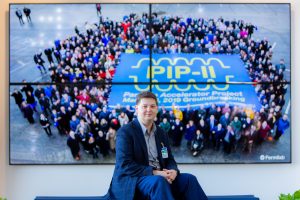In David Ibbett’s latest musical offering as Fermilab guest composer, soprano Beth Sterling sings of the subtle neutrino: “You should be massless … you should be changeless.” Yet experiments have shown that neutrinos have mass and continually change form as they move through time and space.
With “Particle of Doubt,” scored for soprano, violin, viola, cello, piano and electronics, Ibbett creates a plaintive ode to the neutrino’s mysteries.
A four-minute video of the performance as well as the composer’s commentary (which opens with a cameo by Ibbett’s new baby) is now available online. It is a trailer for a larger piece that is planned to premiere at Fermilab in 2021.
In his commentary, Ibbett explains why he was drawn to the ubiquitous and strange particles.
“They don’t quite fit,” Ibbett said. “They have mass, but they shouldn’t, according to the Standard Model, and this raises all sorts of questions and opportunities to take our physics understanding further.”
The video features scenes from an animation of the international Deep Underground Neutrino Experiment, hosted by Fermilab. The groundbreaking experiment is the inspiration for the lyrics.
“Particle of Doubt” features what Ibbett calls a “sonification” of neutrino oscillation, the phenomenon in which a neutrino morphs between its various types. He mapped the probability waves of neutrino transformation to the three string melodies.
With its modern musicality, “Particles of Doubt” underscores that neutrinos are neither massless nor changeless – nor voiceless.
“We’re thrilled to be working with David as Fermilab’s first guest composer,” said Janet MacKay-Galbraith, head of the Fermilab Arts and Lecture Series. “His musical creativity, intellectual curiosity and passion for physics perfectly express the synchronicities between the arts and science. We can’t wait to hear and see what he comes up with next in this year-long endeavor.”
This work is supported by Fermi Research Alliance LLC.
Fermilab is supported by the Office of Science of the U.S. Department of Energy. The Office of Science is the single largest supporter of basic research in the physical sciences in the United States and is working to address some of the most pressing challenges of our time. For more information, visit science.energy.gov.




